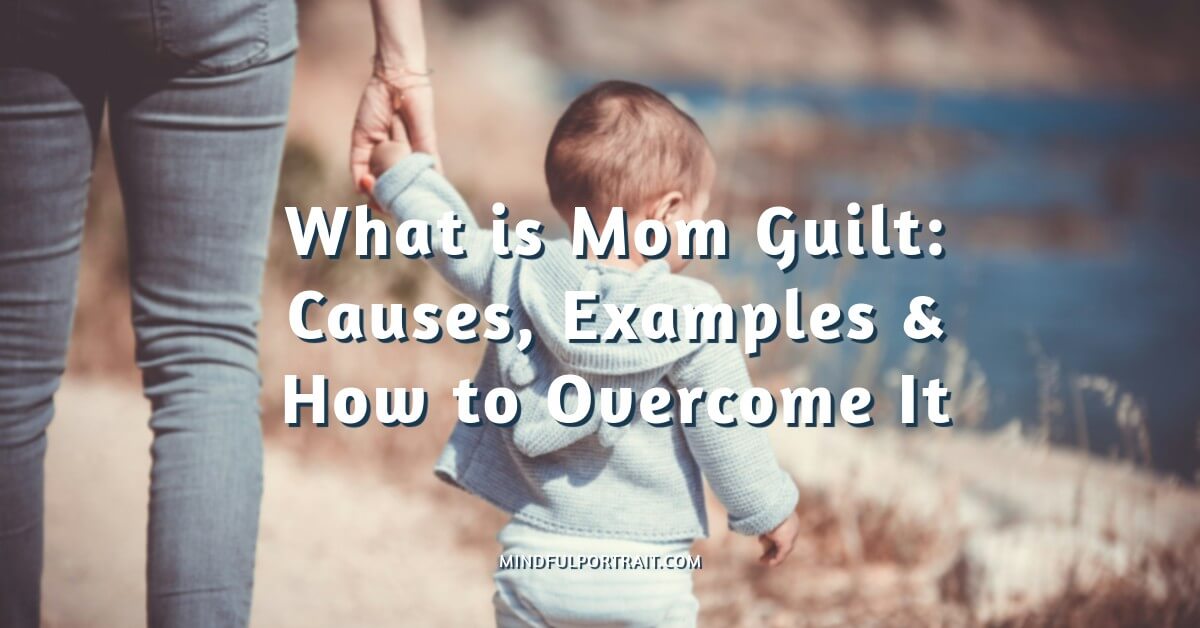Mom Guilt examples are something we hear about every day—shows, articles, and stories all share how motherhood is filled with feelings of inadequacy, self-doubt, and guilt.
Mom guilt is real. Almost every mother has a story to tell about their own experience —whether it’s missing a school event or struggling with work-life balance. Regardless of your children’s age, career choices, or financial situation, many mothers encounter these feelings during their journey.
What is Mom Guilt?
Mom guilt refers to the feelings of guilt and inadequacy that mothers often experience regarding their parenting roles. These feelings can trigger negative emotions and impact their confidence in parenting. Mom guilt can range from normal, healthy levels of constructive self-criticism—which can enhance parenting practices—to dangerous levels that negatively impact mental health. Ultimately, it’s not the mom guilt itself but how you manage these feelings that influences your parenting journey.
Mom Guilt Examples : What does Mom Guilt look like?
Let’s explore some common examples of mom guilt experienced at different stages. This can help you understand that the guilt you are feeling is not unusual. Instead, it highlights how mom guilt is real and relatable.
- Feeding Choices:
Due to social stigma and increasing awareness of the benefits of breast milk, guilt about feeding choices can vary in intensity. This includes guilt over not breastfeeding, supplementing with formula, or not enjoying breastfeeding —often due to the expectation of a ‘divine connection’ and lack of information about the physical and mental challenges involved— . There may also be guilt over wanting to stop pumping or deciding to wean. Most of the time, the guilt stems from not being able to meet breastfeeding goals or the planned duration, making them feel that wanting to stop pumping is a selfish act. - Baby Getting Hurt:
As the primary caregiver, mothers often take responsibility for everything surrounding their baby, leading to feelings of guilt whenever the baby gets hurt. This includes feeling guilty if the baby falls off the bed, gets sick, or gets injured during playtime, perceiving these incidents as a result of their own mistakes or negligence. - Yelling at the Baby:
A common example of mom guilt is feeling guilty after a meltdown. This involves worrying about the baby’s emotions, potential long-term effects, and judging one’s parenting skills based on this incident. - Working Mom Guilt:
Working mom guilt is prevalent, including feelings of guilt about going back to work at an early stage, missing major milestones, working full-time, missing school events, and worrying about what happens in their absence. They often compare themselves to stay-at-home moms and feel inadequate as mothers.
- Guilt About Diet Choices:
Things go upside down when you see a mother who only provides homemade food, is strict about a no-sugar policy, or when you come across some advice from videos or pediatricians. This can lead to confusion about your own dietary decisions for your child. - Screen Time:
Even occasional screen time can intensify negative feelings in moms who are aware of the discussions and potential side effects associated with screen time. - Daycare Guilt:
Guilt associated with daycare can lead to feelings of shame and anxiety, which may persist even after daycare days are over. - Seeking Help:
Asking for help, especially for stay-at-home parents, can trigger feelings of inadequacy as a mother or woman. - Guilt About Missed Moments:
Guilt about not spending enough time with the baby or concerns about the quality of time spent can include worries about not playing with the baby, not taking many pictures together, or missing out on milestone moments. - Guilt from Unnecessary Comparisons:
Parents often feel bad about not being able to provide certain things that others can afford or not being able to fulfill every demand their child makes, such as buying every toy or visiting every place they suggest. - Stay-at-Home Mom Guilt:
This includes feelings of guilt about going out alone, sharing parental or household responsibilities with a partner, taking a break for self-care, or spending money on oneself. - Minor Mistakes:
Guilt can stem from minor mistakes, which are inevitable in parenthood. This may include missing some school events or parties, forgetting to pack dinner, or failing to send a water bottle to school. - Guilt About the Second Baby:
A common form of mom guilt arises when having another baby. This can range from questioning the decision to have another baby, concerns about reduced attention to the older child, or the challenges of sharing love and care between multiple children. - Parenting Styles:
Each parenting style is unique, whether it’s being too strict, too lenient, or practicing gentle parenting based on a child’s individuality. Mothers sometimes feel guilt about their chosen style, especially when comparing themselves to other moms. - Relationship Choices:
Mom guilt about divorce, single parenting, new relationships, or family dynamics is very common these days.
What Causes Mom Guilt?
- Societal Norms:
For generations, society has made us believe that women must fulfill certain roles and meet specific criteria to be considered good mothers. This has led women to impose unrealistic expectations on themselves, contributing to mom guilt. - Hyper-Awareness:
These days, people are overwhelmed with information about parenting styles, trauma, health, and more. This can lead to hyper-awareness, where individuals become excessively vigilant about their actions and decisions. The obsession with monitoring their behavior and the pressure to perfectly apply every piece of advice can disrupt mental peace and lead to feelings of guilt. - Constant Comparisons:
We tend to compare our parenting with that of other parents, as well as our kids with other kids—whether they are siblings, schoolmates, neighbors, friends, or even social media families. These unhealthy comparisons are a major source of mom guilt, especially in the social media-driven era. - Childhood Experiences:
Our childhood experiences or the way we perceived parenting from our parents might influence our overall parenting goals and personality. - Overwhelming Criticisms:
Mothers are often subjected to more criticism in parenting regarding their choices and their child’s behavior. Mom guilt frequently stems from such criticism, whether it comes from family members, pediatricians, teachers, or friends. - Lack of Support:
Another important cause of mom guilt is the lack of support. This can lead mothers to sacrifice their own parental expectations and struggle to manage additional responsibilities effectively. This, in turn, can result in physical and mental exhaustion, leading to burnout and increased stress.
How to Overcome Mom Guilt
- Share Your Feelings:
The best way to overcome mom guilt is to share your feelings with trustworthy and reliable people, especially like-minded fellow mothers. They can help you understand that your feelings are normal and that everyone has experienced similar situations in parenthood or have some mom guilt examples to share . - Seek Help:
Many challenges in motherhood can be managed with a strong support system. Consider hiring a nanny, house help, or any other assistance you need. It’s important to help yourself, share responsibilities, and not hesitate to speak up for yourself. - Stop Comparisons:
No matter how hard you try, you might find yourself making comparisons throughout parenthood. Make it a habit to set clear boundaries and maintain them within healthy limits. Don’t let comparisons undermine your inner peace, parenting journey, or relationships. - Practice Gratitude:
Practicing gratitude can remind you of the good days and successful moments in your parenting journey. Find a method that works for you, such as journaling, photography, conversation, or mindfulness. - Be a Role Model for Your Kids:
Recognize how social norms and generational influences impact women, affect parenting and motherhood, and contribute to mom guilt. Take charge by breaking this cycle: prioritize yourself, acknowledge your journey, and create a healthy environment for future generations. - Set Parenting Goals:
Set realistic parenting goals to monitor your journey and reduce future guilt. This can help you slow down, understand your shortcomings, and work on areas for improvement. - Self-Care:
Finding time for yourself and prioritizing self-care are just as important as parenting. It can help reduce stress, enhance mental health, and improve your overall parenting journey. - Address Issues:
Set aside time to sort your emotions and identify what is truly troubling you. Identify the source of your mom guilt and address it. For example, if social media is the problem, restrict your time on it. Reflect on your feelings, acknowledge your mistakes, and work on trigger points. - Educate Yourself:
Parenting is a learning process. Stay updated with the latest information and practices from trustworthy sources. This approach can boost your confidence and help you avoid mistakes from inexperience. - Seek Professional Help:
If feelings of guilt and shame are affecting your mental health, becoming unmanageable, or persistent, don’t hesitate to seek professional help.
Reflections from Mindful Portrait

Every time you tell yourself that you have failed as a parent or label yourself as a bad mom, take a moment to reflect on your emotions. Stop normalizing mom guilt and break the social stigmas. Moms don’t need to be superwomen or present in every aspect of parenting to fit the term “good mother.” Trust your instincts, forget perfectionism, and enjoy your unique parenting journey. When you reflect on various mom guilt examples, you might find that while mom guilt is real, it can sometimes feel a bit unnecessary. Just make sure these moments of guilt don’t prevent you from enjoying motherhood.

